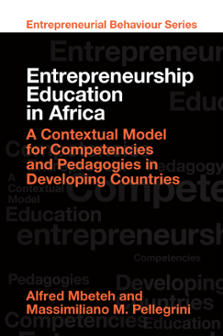Entrepreneurship Education in Africa: A Contextual Model for Competencies and Pedagogies in Developing Countries

Synopsis
Table of contents
(13 chapters)Abstract
This chapter offers some introductory concepts about entrepreneurship education (EE), including definitions, objectives, impacts on unemployment, and key approaches and challenges in implementing it in Higher Education institutions. It concludes by presenting entrepreneurial intention models apt to understand the pedagogical purpose of EE.
Abstract
This chapter aims to offer a panoramic view of the various sets of entrepreneurial competencies and pedagogical approaches in teaching them with specific reference to the bridge between practice-based learning and theory. While there will be a discussion of several relevant authors in the field, one specific part will be dedicated to the EntreComp framework, that is, the European Union (EU) framework for entrepreneurial competencies, which will be used as a basis for the structuring of our model for competencies.
Abstract
This chapter presents the African context, and in particular Sierra Leone, one that can be used as an example with common structural conditions and contingencies of many other African and developing countries. Specifically, this chapter will aim to present a brief history of Sierra Leone, its culture, and an overview of its economic and entrepreneurial ecosystem and related challenges. This chapter will also present clear evidence of the fact that EE needs contextualisation, as much as other studies on entrepreneurship. It will also present an analysis of a set of structural, education-related, and cultural factors that may impede the full application of theoretical models developed in western countries and contexts.
Abstract
This chapter describes the methodology and analyses employed in developing the contextualised framework of entrepreneurial competencies. In particular, the analyses are qualitative with the use of interviews, focus groups, and auto-ethnography interpretation. The data collection was based on a sample of students, professors and lecturers, and practitioners involved in entrepreneurship education. In addition, some preliminary qualitative results are presented to better understand the emergence of the contextualised framework.
In the previous chapter, from the research conducted, it has been determined that a set of 11 entrepreneurial competencies are the most relevant in relation to Sierra Leone. In line with the results of this research, this chapter aims to explain the content/structure, the purpose, and the fit of the context in each competence. The specific competencies include spotting opportunities, creativity, setting a clear vision, self-awareness, and self-efficacy, motivation, and perseverance, mobilisation of resources, financial and economic literacy, management, risk-taking, teamwork, and learning through experience.
Abstract
This chapter aims to further integrate the results on the contextualised set of competencies. Specifically, this chapter will explain relevant pedagogical strategies such as seminars, expert-led workshops, experimentation, case studies, etc. to be used to develop these competencies. In addition to relating each strategy to a specific bundle of competencies, the chapter will conclude with contextualised pedagogical approaches that can be used to increase the relatedness and effectiveness of EE in developing countries.

- DOI
- 10.1108/9781839097027
- Publication date
- 2022-08-01
- Book series
- Entrepreneurial Behaviour Series
-
- Series copyright holder
- Emerald Publishing Limited
- ISBN
- 978-1-83909-703-4
- eISBN
- 978-1-83909-702-7